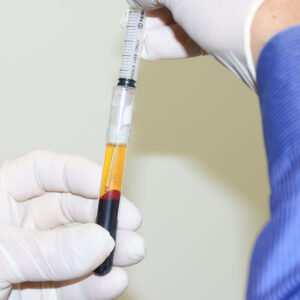PRP INJECTIONS
PRP Injections

Platelet-rich plasma (PRP) injections are a medical treatment that involves using a concentrated solution of a patient’s own blood platelets to promote healing and tissue regeneration. Platelets contain growth factors and other bioactive substances that play a crucial role in the body’s natural healing processes. PRP injections are used in various medical fields, including orthopedics, sports medicine, dermatology, and more.
Procedure:
During a PRP injection procedure:
- Blood Collection: A small amount of the patient’s blood is drawn, similar to a routine blood test.
- Centrifugation: The drawn blood is processed in a centrifuge machine to separate the platelets and other components from the rest of the blood.
- Concentration: The resulting platelet-rich plasma is a concentrated solution containing a higher-than-normal number of platelets and growth factors.
- Injection: The PRP solution is then injected into the targeted area of the body, such as a joint, tendon, or skin.
Applications:
PRP injections are used for a variety of purposes, including:
- Orthopedics and Sports Medicine: PRP injections are often used to treat musculoskeletal injuries, such as tendonitis, ligament injuries, and osteoarthritis.
- Dermatology: PRP can be used in cosmetic procedures to rejuvenate the skin and improve its texture and appearance.
- Hair Restoration: PRP injections are used to stimulate hair growth in cases of hair loss.
Potential Benefits:
- Tissue Healing: PRP injections are believed to promote tissue healing and regeneration by delivering concentrated growth factors to the site of injury.
- Reduced Pain: Some patients experience reduced pain and improved function after PRP injections, particularly in cases of tendonitis and osteoarthritis.
- Non-Invasive: PRP injections are minimally invasive and involve using the patient’s own blood, reducing the risk of adverse reactions.
Considerations:
- Evidence: While PRP injections have gained popularity, the scientific evidence supporting their effectiveness is mixed, and more research is needed to fully understand their benefits.
- Individual Response: Not all patients experience the same level of improvement from PRP injections, and results can vary.
- Cost: PRP injections may not be covered by insurance and can be relatively expensive.
Consultation: If you’re considering PRP injections, it’s important to consult with a qualified healthcare provider. They can assess your condition, discuss potential benefits and risks, and help you determine if PRP injections are a suitable treatment option for your specific needs.
As with any medical treatment, it’s advisable to make an informed decision after discussing the available evidence and potential outcomes with a healthcare professional.
IF YOU NEED TO SEE A SPECIALIST, CONTACT US TO SCHEDULE YOUR APPOINTMENT TODAY!
Contact Us
Ask a question or book an appointment below.
